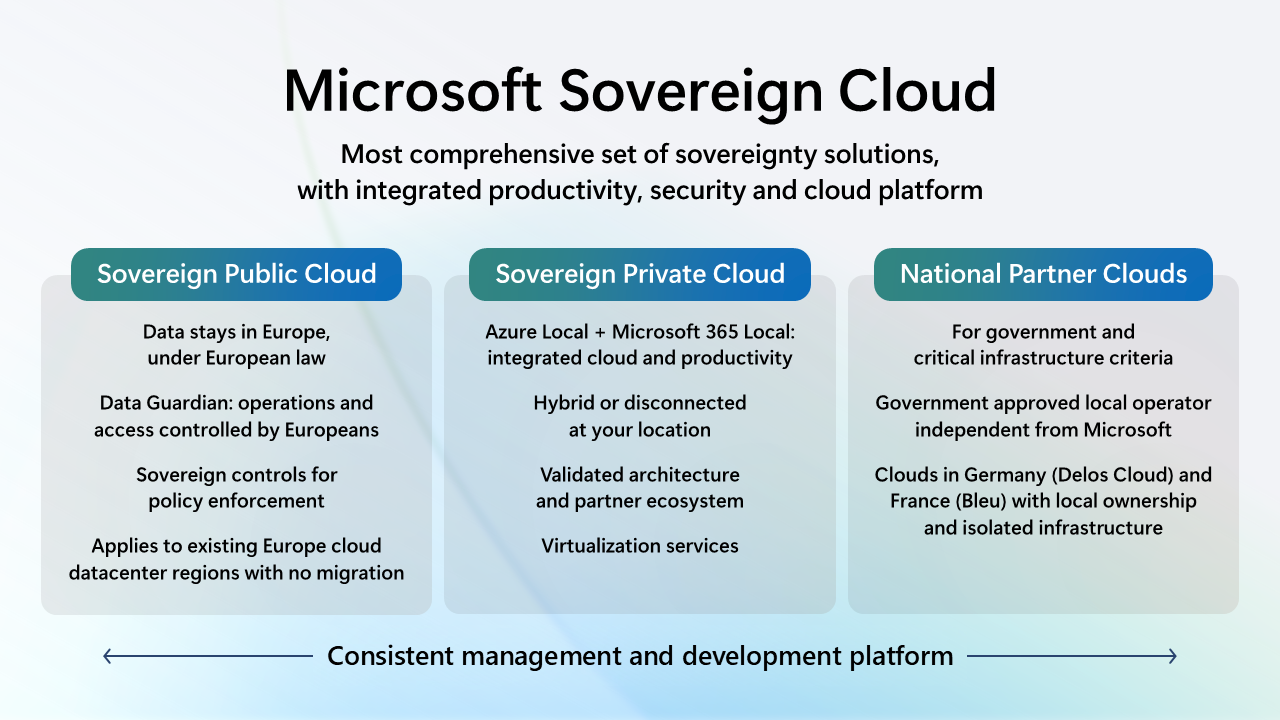Microsoft’s latest announcement around Sovereign Cloud solutions marks an important milestone for European organizations. At the center of this news is Microsoft 365 Local — a new way to run productivity services like Exchange and SharePoint inside environments fully controlled by the customer, powered by Azure Local.

Why Microsoft 365 Local?
For many organizations in government, defense, healthcare, finance, or critical infrastructure, data sovereignty isn’t just a preference — it’s a legal and operational requirement. Traditional Microsoft 365 in the public cloud offers agility and innovation, but sometimes it can’t meet the strictest demands around compliance and control.
Microsoft 365 Local bridges that gap by allowing customers to:
- Keep their productivity data within their own datacenter or a trusted national partner cloud.
- Enforce data residency, encryption, and governance policies locally.
- Maintain resilience even if external connectivity is interrupted.
- Gradually adopt hybrid or cloud models where regulations allow.
Benefits at a Glance
- Sovereignty and compliance – meet European regulatory requirements without sacrificing collaboration tools.
- Operational control – customers decide how infrastructure is run, monitored, and audited.
- Continuity and resilience – work productivity remains available even in disconnected scenarios.
- Hybrid flexibility – integrate with public cloud services at your own pace.
Challenges Ahead
Of course, with control comes responsibility. Running Microsoft 365 Local requires careful planning around infrastructure operations, scaling, updates, and costs. Not every cloud feature will be available at launch, and organizations will need to evaluate whether the added sovereignty justifies the added complexity.
What It Means for European Organizations
Microsoft 365 Local is more than just a product — it’s part of a broader shift toward sovereign cloud strategies in Europe. It gives organizations a realistic pathway to modernize collaboration and productivity while staying aligned with national regulations and security expectations.
Technical Requirements
To run Microsoft 365 Local, organizations need to be prepared for a more infrastructure-heavy deployment compared to the public cloud. Key requirements include:
- Azure Local infrastructure: Microsoft 365 Local is built to run on top of Azure Local (a sovereign private cloud platform), which means customers need the hardware, networking, and virtualization stack validated by Microsoft.
- Dedicated datacenter capacity: Sufficient compute, storage, and networking resources must be allocated to host Exchange, SharePoint, Teams services, and related workloads.
- Identity and access management: Integration with Active Directory or Azure Active Directory (Entra ID) is required for authentication, authorization, and policy enforcement.
- Connectivity planning: While services can run in isolation, hybrid scenarios require secure, managed links to Microsoft’s public cloud for updates, telemetry, or selective feature integration.
- Operational capabilities: Teams must be equipped to handle patching, updates, backups, and monitoring, which Microsoft normally manages in the public cloud.
These requirements mean that Microsoft 365 Local is best suited for organizations that already operate, or are willing to invest in, robust IT and datacenter capabilities — often in collaboration with trusted partners.
For many European organizations, Microsoft 365 Local could become the best of both worlds: modern productivity with full sovereignty. It’s a solution designed for those who need to balance innovation with compliance — and it may well shape the future of digital transformation across regulated sectors in Europe.

